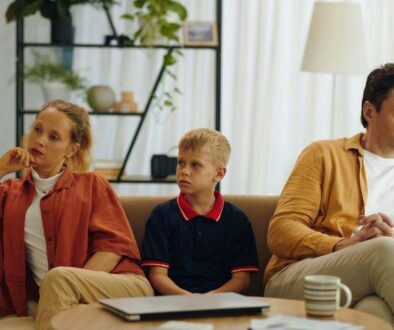Parent Financial Responsibility Law
Every state has enacted some version of a parental responsibility law. These are civil statutes that can be used to hold a parent or guardian financially responsible when a minor child commits certain acts. The specifics vary from state to state in terms of the type of conduct that will trigger parental liability, as well as the extent of a parent’s financial exposure. In this blog submission, I have focused on parental responsibility law in Wisconsin, the full text of which can be found at Wisconsin Statutes section 895.035.
Who Can Be Liable Under Wisconsin’s Parental Responsibility Law?
Under section 895.035, a parent who has custody of a minor child can be held financially liable for certain harm caused resulting from that child’s conduct. For purposes of this law, “custody” means:
•· legal custody via a court order
•· custody that is agreed upon under a legal stipulation, or
•· actual physical custody of a child.
Section 895.035 makes clear that, “in determining which parent has custody of a child for purposes of this section, the court shall consider which parent had responsibility for caring for and supervising the child at the time the act that caused the injury, damage or loss occurred.”
The law also specifies that a parent does not have custody if, at the time of the violation:
•· the minor was married
•· the minor was legally emancipated, or
•· the parent did not have the reasonable ability to exercise supervision and control of the child — either because the child was “uncontrollable” or because someone else interfered with the parent’s ability to control the child.
What Kind of Conduct Triggers Parental Liability in Wisconsin?
Under section 895.035, a parent can be on the financial hook for the results of a child’s “willful, malicious, or wanton” acts.
Specifically, the parent can be liable for:
•· damages to property
•· the cost of repairing or replacing damaged property
•· the cost of removing marking, drawing, writing, or etching from property after a graffiti violation
•· the value of unrecovered stolen property, and
•· harm resulting from personal injury.
It’s important to emphasize that a parent is only liable under section 895.035 when a minor acts willfully, maliciously, or wantonly. That means the minor acted purposefully, or at least with a certain recklessness or clear disregard for the possibly detrimental consequences of the actions.
If the minor merely acts carelessly and ends up causing some kind of accident (including a car accident), that is not enough to trigger a parent’s liability under Wisconsin’s parental responsibility law. However, the statute would apply if a minor commits vandalism or an act of assault and battery against someone else.
What is the Dollar Limit of a Parent’s Liability Under Section 895.035?
Wisconsin Statutes section 895.035 specifically caps a parent’s financial liability at $5,000 for any single act committed by a minor. So a claimant won’t be able to recover more than that amount from a parent, no matter how much damage or harm resulted from the minor’s actions.
The only exceptions are:
•· A school district or private school can recover up to $20,000 against the parent of a minor who commits an act — or makes a threat to commit an act — that endangers a school or its students, including a bomb threat, arson, or other kinds of property damage.
•· If a minor commits retail theft, the parent will be liable for the retail value of the stolen goods or services (unless the goods are returned undamaged or unused), plus up to $300 total as compensation for “exemplary” damages and the store’s attorney’s fees in bringing the action.
Wisconsin Parents May Be Liable Beyond Section 895.035
In Wisconsin, parental liability for a child’s actions may still exist under traditional fault theories like negligence, regardless of what section 895.035 says.
Though it isn’t the easiest case to make, a parent may be liable for any resulting harm (including personal injuries and property damage) if they know of their child’s dangerous tendencies, yet they fail to take reasonable steps to properly supervise the child, and someone ends up suffering foreseeable harm.
•· There is a separate statute that imposes liability on parents in cases involving the use of motor vehicles in a negligent and willful manner by their respective child(ren) (or child(ren) that an adult may choose to sponsor outside of the family unit). This statute is Wis. Stat. § 343.15(2)(b), also known as “Sponsorship Liability.” The statute provides:
Any negligence or willful misconduct of a person under the age of 18 years when operating a motor vehicle upon the highways is imputed to the parents where both have custody and either parent signed as sponsor, otherwise, it is imputed to the adult sponsor who signed the application for such person’s license. The parents or the adult sponsor is jointly and severally liable with such operator for any damages caused by such negligent or willful misconduct.
This law imposes unlimited liability upon parents or adult sponsors of a minor’s driver’s license. (I wonder how many parents are aware of this provision before an accident.) Somewhat paradoxically, Wisconsin has a $5,000.00 limit on non-vehicular damages “for personal injury attributable to a willful, malicious, or wanton act of the child,” as enumerated in section 895.035 (2)(a), (4), as addressed explicitly above. On the other hand, if your child “negligently” causes a vehicular accident, the parent faces unlimited liability. The current law imposes unlimited liability upon parents or adult sponsors of a driver’s license. However, parents cannot insure for any one large loss, and such a loss can lead to the financial ruin of the parent or sponsor. There have been recent proposed amendments by the Wisconsin state legislature to impose cap limits of $300,000.00 and to allow a parent or sponsor to secure insurance to $300,000.00 (multiple times the current minimum limit for a liability policy in Wisconsin). Parents would then be able to protect themselves from unlimited liability. This would eliminate the game of “Russian Roulette,” which all parents and sponsors play whenever a minor is given the keys to a vehicle. The recent proposed amendments to this statute would not impact drivers’ responsibility for all damages. However, it would allow parents who have responsibly secured insurance to limit their liability to a figure far beyond the minimum limit to obtain some semblance of financial security.



